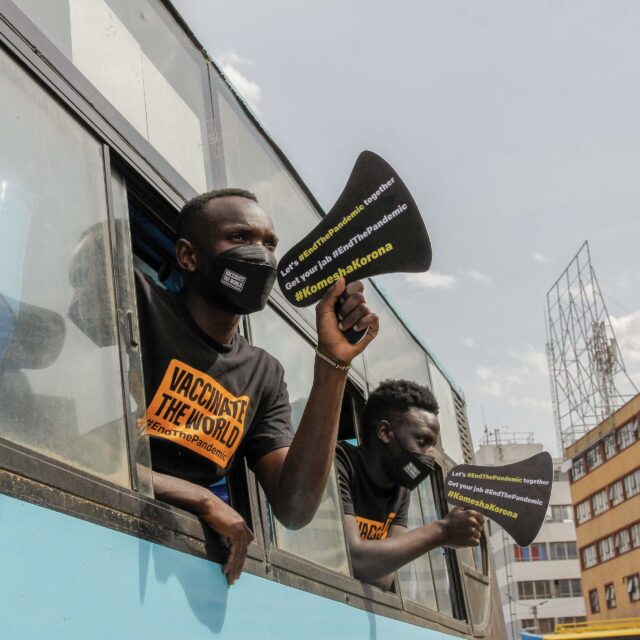Books are powerful. They can be tools of change, they can inspire people far and wide, and they can transform how you see the world.
That‘s why we reached out to members of ONE‘s global team to ask them what books have inspired them throughout their activism journeys. Whether you‘re just starting your summer reading list or are powering through it, here are 12 book recommendations that will inspire you to take action.
“Evicted” by Matthew Desmond
What it‘s about: “Evicted” speaks to the impact and heartbreak of poverty on a person‘s life by following eight families through their struggle to stay afloat in America. The author uses these real-life stories to highlight important issues related to extreme poverty and affordable housing.
Why we recommend it: It‘s not easy to read this book – to hear the stories of real people facing these devastating situations and struggling to live. But it‘s an important read. While the author includes data points, I think the way he writes about these families powerfully connects the reader to a real-life issue in America. It‘s forever changed the way I think about poverty, homelessness, and our responsibility to be part of the solution. – Natalia, Internal Communications Manager, United States
“I Write What I Like” by Steve Biko
What it‘s about: “I Write What I Like” is a compilation of writings by South African anti-apartheid activist Steve Biko. The book includes writings from 1969-1972, from when Biko was the president of the South African Student‘s Organization, all the way to when he was prohibited from publishing.
Why we recommend it: During my academic sabbatical at the University of Cape Town in 2020, I was deeply moved by the #BlackLivesMatter protests around the world. I soon began my own journey of decolonization to better understand the roots of racism in South Africa. I had heard of Steve Biko before this — but never read any of his writings or saw him as relevant because I thought that with the end of apartheid, racism just wasn’t going to be that much of an issue anymore. After reading his book, I now know better and understand that racism is a colonial construct embedded in every system of society and was created to divide society based on skin color. Thanks to Steve and his teachings on black consciousness in the book, I now realise that the only way we can heal as a nation is by transcending the inferiority complex imposed on us by the colonial mentality that we were conditioned to take on. – Thomas, Africa Digital and Social Media Consultant, South Africa
“Less is More” by Jason Hickel
What it‘s about: In “Less is More,” Hickel weighs in on the concept of “degrowth” and how we could create a new system that‘s fit for today and the future.https://www.jobsnowafrica.org/ He explores health, jobs, and progress in the 21st century and beyond.
Why we recommend it: What I liked about this book? It‘s disruptive, provocative, direct, data-driven, and inspiring. It helps us rethink issues like development, economic growth, and ecological collapse. It helps connect the dots and understand how to tackle systemic issues. It offers a vision of a better, different future. – Benjamin, Global Campaigns Director, France
“Cria da Favela” by Renata Souza
What it‘s about: “Cria da Favela” is a powerful narrative about the Police Pacifying Units in the “favelas” (or low-income settlements) in Rio de Janeiro, Brazil. These units were installed to “improve” safety around big events in Rio, such as the 2014 World Cup and 2016 Olympic Games. As a resident of a favela, Souza describes the injustices committed by the Police Pacifying Units toward ordinary residents. She challenges negative stereotypes created by the media and politicians, and she shows how favela residents stand together in solidarity. They use Facebook and other tools to protect each other, challenge attitudes, and denounce acts of violence.
Why we recommend it: I love this book because it really shows that when people come together, no matter where they are from or how stigmatised they have been, they can push for change and make the truth shine through. – Katrina, Campaigns Officer, United Kingdom
“Rest in Power” by Sybrina Fulton and Tracy Martin
What it‘s about: In “Rest in Power,” Trayvon Martin‘s parents recount the tragic events that led to Trayvon‘s death. The book goes beyond the news cycle and offers a perspective that only his parents could. It‘s a story of the “beautiful and complex child” they lost, the unresponsiveness of the police and legal system, and their journey from grief and pain to power and purpose.
Why we recommend it: The book marks the start of a movement. Knowing Trayvon‘s story was important, it‘s painful. You can feel the pain in their telling of this story. It makes you feel angry, sad, and unsettled. And that‘s where advocacy begins. – Natalia, Internal Communications Manager, United States
“Keeping Hope Alive” by Dr. Hawa Abdi
What it‘s about: Known as the “Mother Teresa of Somalia,” this memoir follows the story of Dr. Hawa Abdi. Following the collapse of the Somali government in 1991, she committed to helping those who were impacted by violence and poverty. The memoir follows how she and her daughters helped 90,000 people who were displaced in the country.
Why we recommend it: This inspires me to think of what I can do with the little or much that I have to fight for change, and also make a difference in someone’s life despite challenges around us. – Afrikana, Policy and Advocacy Consultant, Kenya
“Purple Hibiscus” by Chimamanda Ngozi Adichie
What it‘s about: “Purple Hibiscus” focuses on 15-year-old Kambili and life in her family compound in Nigeria. The story follows Kambili and how she lives in the shadow of her religious, wealthy father, who is repressive at home. But following a military coup, Kambili and her sibling move in with their aunt, where they discover that there is “a life and love beyond the confines of their father‘s authority.”
Why we recommend it: In every manner, this book explains oppression. The oppressive force of the protagonist’s father is physical and emotional torture. You can tell from the opening chapter that he is driven to the utmost extremities of passion, including extreme love (faith) and extreme rage (physical abuse). Kambili and the rest of her family suffered a feeling of helplessness. Although some readers may be unfamiliar with it, certain people encounter it frequently. As a child, I witnessed a similar event take place in my neighborhood. The final result of the gender-based violence Kambili’s mother suffered has stayed in my memory ever since I turned the final chapter of the novel. It compels me to speak and raise awareness of the suffering experienced by women around the world. They must not suffer in silence or be haunted by the consequence of their abuser‘s action.” – Uzezi, Social Media Community Engagement Coordinator, Nigeria
“Bayard Rustin: Troubles I‘ve Seen” by Jervis Anderson
What it‘s about: “Bayard Rustin: Troubles I‘ve Seen” is the biography of civil rights activist Bayard Rustin. From participating in the Montgomery bus boycott to being an organizer of the March on Washington, this biography explores the life of this incredible activist.
Why we recommend it: Bayard Rustin is most well-known for his work with Martin Luther King Jr., but he has a compelling story in his own right! Born into a religious and pacifist community, Bayard‘s journey through activism is complex and powerful. As a creative organizer, these are many lessons we can continue to garner from his legacy. He worked for over 60 years as a “troublemaker” and is a civil rights hero. – Justin, Media Manager, Canada
“You Have Struck a Rock: Women Fighting for Their Power in South Africa” by Gugulethu Mhlungu
What it‘s about: Gugulethu Mhlungu explores how history has formed the challenges women experience today in “You Have Struck a Rock.” She pulls from the experiences of women from all walks of life — students, domestic workers, political activists, and more, and explores how there is work to be done “in making the real South Africa imagined by the Constitution.”
Why we recommend it: This book introduced me to so many unknown women activists who advocate for the most vulnerable women of South Africa, including domestic workers and sex workers. Gugu’s writing inspires me to not be afraid to stand up and raise my voice about the most pressing issues in South Africa… and to dismantle the patriarchy…obviously. – Lerusha, Senior Designer, South Africa
“I am Malala” by Malala Yousafzai
What it‘s about: “I am Malala” is an autobiography written by Nobel Prize winner Malala Yousafzai. It tells the story of how she was born in Pakistan and witnessed first-hand the encroachment of the Taliban on the rights of women and girls. She continued to go to school and spoke up about why she thought education for girls was important. Because of this, the Taliban shot her in the head at the age of 15. She was forced to leave Pakistan and establish a new home in Birmingham, UK.
Why we recommend it: I found Malala‘s story hugely inspiring. What also struck me was how hard it must have been to leave behind her beautiful homeland and friends, to set up in a completely new place, despite how well-known and successful she would become as an activist. – Katrina, Campaigns Officer, United Kingdom
“The Havoc of Choice” by Wanjiru Koinange
What it‘s about: “The Havoc of Choice” is a fiction novel that follows the story of Kavata and her family in the aftermath of a post-election Kenya, where the country begins to fall apart. Her family experiences challenges and falls apart simultaneously, and the novel follows how Kavata and her family find their way back to each other. Koinange‘s novel explores the impacts of corruption and colonization through the lens of a single family.
Why we recommend it: This book is a great point of reflection for me, particularly as we gear for the Kenya general elections in August. It is a mirror into aspects of identity and governance that every activist should interrogate. – Afrikana, Policy and Advocacy Consultant, Kenya
“And the Band Played On: Politics, People, and the AIDS Epidemic” by Randy Shilts
What it‘s about: “And the Band Played On” deep dives into the AIDS epidemic. Author Randy Shilts weighs in on what led to the unchecked spread of the disease in the early 1980s, and has provided the foundation for how the AIDS epidemic was discussed years after.
Why we recommend it: As we continue to campaign in the face of the global AIDS epidemic, “And the Band Played On” is a wonderfully stark and vivid capture of the height of the US AIDS crisis. This book was written in 1987, making it a bit of a time capsule that shines a light on the front-line perspective at such a challenging time. Dive into the maddening world that unearths government inaction, activists, and the struggle to shine a light on issues that are life and death to people and yet “just statistics” to people in power. This book will madden you, sadden you, and light a fire in your activist core! – Justin, Media Manager, Canada



